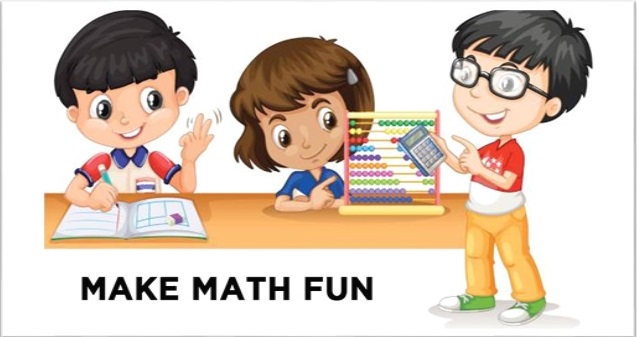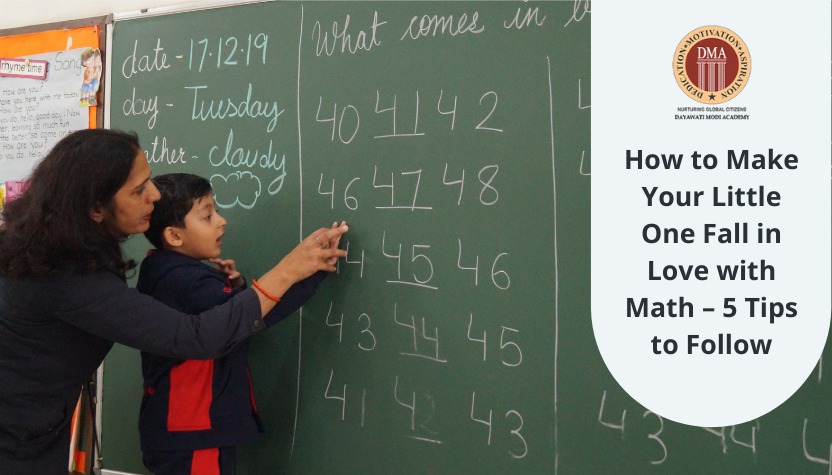
Dear Math,
Please grow up and solve your own problems.
Kind Regards,
Kids Association of the World
Does it sound like a letter that your child could have written? Well, you are not alone. Research reveals that ‘number anxiety,’ or a fear of math and numbers, is a very serious issue that almost 90% of children face. While some learn to love the subject, others simply cannot get over this.
It, thus, becomes the responsibility of the parents and teachers to try and make children fall in love with numbers instead of simply teaching them concepts. At Dayawati Modi Academy, one among the Top 10 Schools in Meerut, we undertake this responsibility of ours very seriously and thus resort to our math labs and engaging learning techniques to help foster a fondness for the subject among our pupils right from an early age. And today, we would like to share a few easy steps with our parent community that you all can try at home to alleviate your child’s fear of numbers. Read on.
The Brain Chemistry of Number Anxiety

What happens is that when the kids see numbers, a specific part of their brain that reacts to fear stimuli lights up. This is very similar to what happens when people see spiders, snakes, or anything that scares them. This fear center signals a freight response, shutting down the problem-solving center of our brain.
So basically, if you see, children do not actually fear numbers but are scared of the feeling of ‘helplessness’ that they feel when trying to solve mathematical problems.
5 Ways of Making Math Your Kid’s BFF
#1 Teach Concepts Using Games and Puzzles
Learning by playing is the best kind of learning for any child. When children learn mathematical concepts through board games like chess, dominoes, monopoly, and puzzles, they learn to visualize numbers. That’s because such games and puzzles engage their tactile senses as well as their visual senses. As a result, they can better process concepts and not feel overwhelmed by formulae or equations.

#2 Make Math Relevant to Everyday Situations
The traditional system of education impartation has almost always depended on systematically teaching mathematics to children by forced memorization and individual modules. While this works for some kids, others, especially the empathetic ones, face challenges in finding any relevance to such study techniques.
The trick is to connect mathematical concepts with situations that your child faces every day. At Dayawati Modi Academy, we encourage parents to use such connective learning strategies instead of using the individualistic approach. For example, you can easily teach your kids about those dreaded trigonometric concepts of heights and distances while trekking or cycling up a hill instead of trying to explain the same with a copy and pencil.
#3 Find Mathematical Concepts and Patterns in Activities They Love
The best (and worst) part of mathematics is how common it is. It is just not limited to the classroom or your house. Hence, try encouraging your child to calculate the price of 250 grams of sugar when you are at the grocery store or find out the price of their favorite Iron Man toy set after a 20% discount, and see how nicely they start showing interest in those numbers.
#4 Include Books That Talk About Math in Their Reading List
Reading is an excellent bonding and knowledge-sharing activity, and most kids love reading storybooks. Choosing books that talk about mathematics, like The Three Little Pigs, One Hundred Angry Ants, etc., can help them look at numbers in a different light.
#5 Don’t Let Your Fear of Numbers Affect Your Kid’s Learning
Last but not the least – No matter your relationship status with the subject, do not let it dampen your child’s learning progress. Be a role model for them.

We, at Dayawati Modi Academy, ranked among the top 10 schools in Meerut, firmly believe that a good grasp of mathematical concepts is what helps us in everyday situations and is the foundation for several new technologies like AI and Blockchain. We thus leave no stones unturned in helping our students develop an interest in the subject. We make use of abacus, cubetto, puzzles, and other math lab activities to actively engage our students in learning math. It aids in building the concepts in an effortless manner and helps the young minds get rid of any fear for the subject.
Thus, math learning at Dayawati Modi Academy is not only about solving sums with a pen and paper but is rather about visualizing numbers and thereby learning math in an easy and fun-filled way. With our innovative pedagogy and state-of-the-art math lab, we, at Dayawati Modi Academy, have successfully created an environment where learning mathematics is complete fun for even the youngest of our students.

